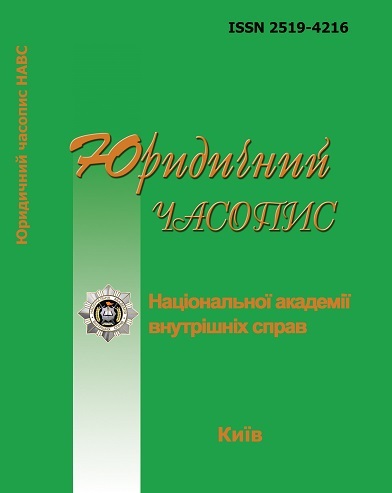Philosophy of Law as a Fundamental Science of Law
Abstract
In the article, based on the opinions of foreign and domestic scientists, the scientific disciplinary status of the philosophy of law has been studied. There are eight directions for understanding this status. The authorʼs view of him is described, according to which the philosophy of law is a fundamental legal science. The authorʼs definition of the philosophy of law as a legal science on the essential laws of the emergence, development and functioning of legal phenomena is presented.
The current state of the philosophy of law allows us to state that the process of formation of the general philosophy of law is intensively taking place and a special philosophy of law (philosophy of crime, philosophy of law-making, etc.) begins to develop. The logic of the development of knowledge, built on the principle of «from general to concrete», is also characteristic of the philosophy of law. We can distinguish the following stages: the philosophy of law as a philosophical science, the philosophy of law as a philosophical and legal science, the philosophy of law as a legal science, the philosophy of individual legal phenomena. The author proposed his own definition of the object of the philosophy of law, to which he refers the laws of life of the legal sphere of society, which includes: the legal system, the phenomena that determine the legal system, the phenomena are connected with the legal system. The subject of the philosophy of law, he considers the essential laws of the emergence, development, functioning of legal phenomena. The forecast of tendencies of development of philosophy of the right is stated.Downloads
Abstract views: 146 PDF Downloads: 2136
Copyright (c) 2018 Law Magazine of the National Academy of Internal Affairs

This work is licensed under a Creative Commons Attribution-NonCommercial-NoDerivatives 4.0 International License.
- Authors reserve the right to authorship of their own work and transfer to the magazine the right of the first publication of this work under the terms of the Creative Commons Attribution License, which allows other persons to freely distribute published work with mandatory reference to authors of the original work and the first publication of an article in this magazine.
- Authors have the right to enter into separate additional agreements on non-exclusive dissemination of the work in the form in which it was published in the journal (for example, to post an article in the institution's repository or to publish as part of a monograph), provided that the link to the first publication of the work in this journal is maintained.
- The journal's policy allows and encourages the posting of articles by authors on the Internet (for example, in electronic storehouses of institutions or on personal websites), both before the submission of this manuscript to the editorial office and during its editorial processing, as this contributes to the creation of a productive scientific discussion and positively affects the efficiency and dynamics of citing the published work.




